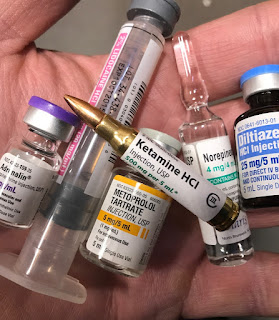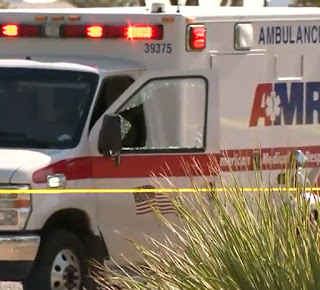Metacognition. Fancy Word, Easy Concept
Many moons ago, when I first became a paramedic, things were different. The expectations placed on EMS providers were not terribly demanding. Show up on time. Look professional. Stay calm. Do A,B,C's. Don't kill your patients. This was really not a tall order. Even at the paramedic level the philosophy was basically the same. The only difference was that the A,B,C's came with a few extra pieces of knowledge, and there were more things at one's disposal to potentially kill patients.
Nonetheless, there were still people who we knew were "great providers." These men and women stood above their colleagues. They were the people who other EMS providers referred to when quipping "If I ever go down, I want So and So." They were the mentors we looked up to. They were the providers that made fire chiefs and police officers breathe a sigh of relief when they hopped out of the ambulance. They were the ones that made us want to up our level of care. They were great because they both took their jobs seriously, and they decided not to stop learning once their certification showed up in the mail.
Things have changed. It's no longer enough to remain calm and practice your A,B,C's (or is it C, A, B now)? It's not good enough to simply have a certificate and a few years on the road. Many of the "Veterans" on the street fall back onto decades of service to establish authority and to identify mastery of the craft. That, too, is not good enough. You can have twenty years on the job, but if you're still assessing the same way, approaching patient care the same way, and diagnosing the same way, you're doing it wrong. You have "one year of experience repeated twenty times" as the saying goes, and while you might not kill anybody, you're probably not going to shine as a provider either. Like a tube TV, you have begun to phase yourself out. You were hot and sought after once, but now EMS can't give you away.
I'm not picking on veteran providers, and even if you fall into this category of professional evanescence, it's not totally your fault. Look at what we are expected to do now:
- Read and interpret 12-lead ECGs and decipher STEMI from STEMI mimics.
- Decide if a CVA is a large-vessel variety and determine the most appropriate destination for the patient.
- Interpret ETCO2, not just as a method for confirming tube placement, but to diagnose specific pathologies like P.E., sepsis, bronchospasm, and shock.
- Use clinical judgement to determine not which medication, but which of two or three similar medications is best for a specific patient.
- Call cardiac arrests in the field when apprpriate.
And it isn’t going to end there. Technology is advancing at such a rapid pace that tests and procedures that were once the realm of highly specialized technicians or even physicians will soon be common place in the back of the ambulance. Can you say “ultrasound?” “tPA?” “TXA?” With the advent of community paramedics we may also see skills being added to our scope of care - wound care, sutures, nutrition. With all these advancements the dinosaurs of emergency medical services will one by one begin to face a critical decision: either become a student of medicine again, or get out of the field altogether. I would prefer to see the former, and that brings us at last to the title of this piece - metacognition.
In simple terms metacognition just means the way you think about your own thought process. It is a very important educational concept because having knowledge of the way you think and the way you process information will help you to be a faster, more efficient learner. It turns out that metacognition can also make you a better provider if you use it.
It’s really just a bit of self reflective practice - asking questions of yourself.
“Why do I believe this to be true?”
“What is the best way for me to learn more about this?”
“Why do I keep making this mistake?”
“Is this similar to something I have seen before?”
This blog entry: https://blog.innerdrive.co.uk/9-questions-to-improve-metacognition gives a fantastic description of how to use metacognition in the educational setting. I’ve adapted it for EMS providers in the six-step flowchart above.
In order to be successful in this endeavor the first thing one must do is check the ego at the door. I’ll spare you the suspense: you are not perfect as a medical provider. Not only are you not perfect, but there are many people out there who are better than you. My professional medical career took a wonderful turn for the better as soon as I embraced and accepted these truths. And once you are over yourself, the six-step process can begin on every call. It can be boiled down to six questions.
“What do I think is going on with this patient?”
“Why do I think that this is the problem?”
“What, physiologically speaking, am I hoping to accomplish with the various interventions I am performing?”
“Is there any other medical problem that might mimic what I am seeing in this patient?”
“Do any other medical providers have a different idea about this patient’s presentation?”
“Where can I find more information about the problem I believe I am treating?”
That’s it! You have begun a journey of self discovery and learning which will continuously reward you with new information, fresh perspectives, insight on upcoming changes in treatment paradigms, and a vast array of other pertinent medical knowledge. All this will help elevate you from a “technician” to a “clinician.” You’ll stop bemoaning protocols as ropes that tie you, instead seeing them as a rope that GUIDES you. You’ll understand the rope, why it is where it is, and when it might be better to let go of it momentarily. You’ll be what the best providers have always dreamed of being - a true medical professional - and that will make our industry stronger.
Study hard!



Comments
Post a Comment